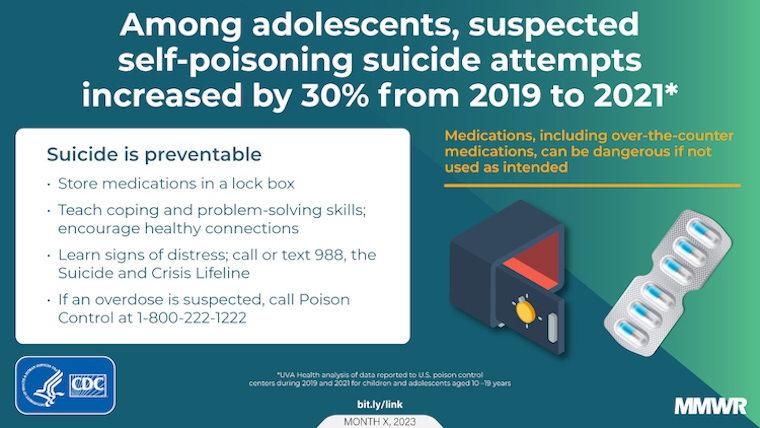Suspected suicide attempts by poisoning among children and adolescents ages 10-19 increased by almost a third during the COVID-19 pandemic's first full year, a new study suggests.
Our new findings are based on cases reported by U.S. poison centers to the National Poison Data System. According to the data, the overall increase in suspected suicide attempts by poisoning among ages 10-19 was 30% in 2021 compared with to 2019. The percentage increase among ages 10-12 was even worse, jumping a whopping 73%. Among those age 13-15, the rate increased 48.8%.
The vast majority of the reported attempts were by girls: Girls accounted for 77% among ages 10-19 in 2019 and 81.2% in 2021.
“This significant increase in suicide attempts during the pandemic surprised us,” said Christopher Holstege, MD, medical director of the Blue Ridge Poison Center at UVA Health and chief of the Division of Medical Toxicology at the School of Medicine. “We are alarmed at the dramatic increase in suicide attempts in such a young population, which continues to escalate according to our data.”
The increases occurred while overall calls to the nation’s poison centers decreased 3.1% from 2019.
The substances used most often in the reported suicide attempts were the over-the-counter pain relievers acetaminophen and ibuprofen. The other most used substances were antidepressant medications sertraline and fluoxetine, along with diphenhydramine, an over-the-counter antihistamine.
To address the troubling statistics, the researchers are calling for a comprehensive approach to suicide prevention that would bring together efforts by families, teachers, public health leaders and mental health professionals. They also suggest additional safety measures such as heightened public education initiatives on the safe storage of over-the-counter medications, as well as awareness campaigns around the hotline to America’s poison centers, 1-800-222-1222. And they recommend promotion of the national 988 Suicide and Crisis Lifeline.
“As a society, we need to come together in a multidisciplinary manner and strategize on how to best mitigate this rapidly escalating threat to our youth,” Dr. Holstege said.
